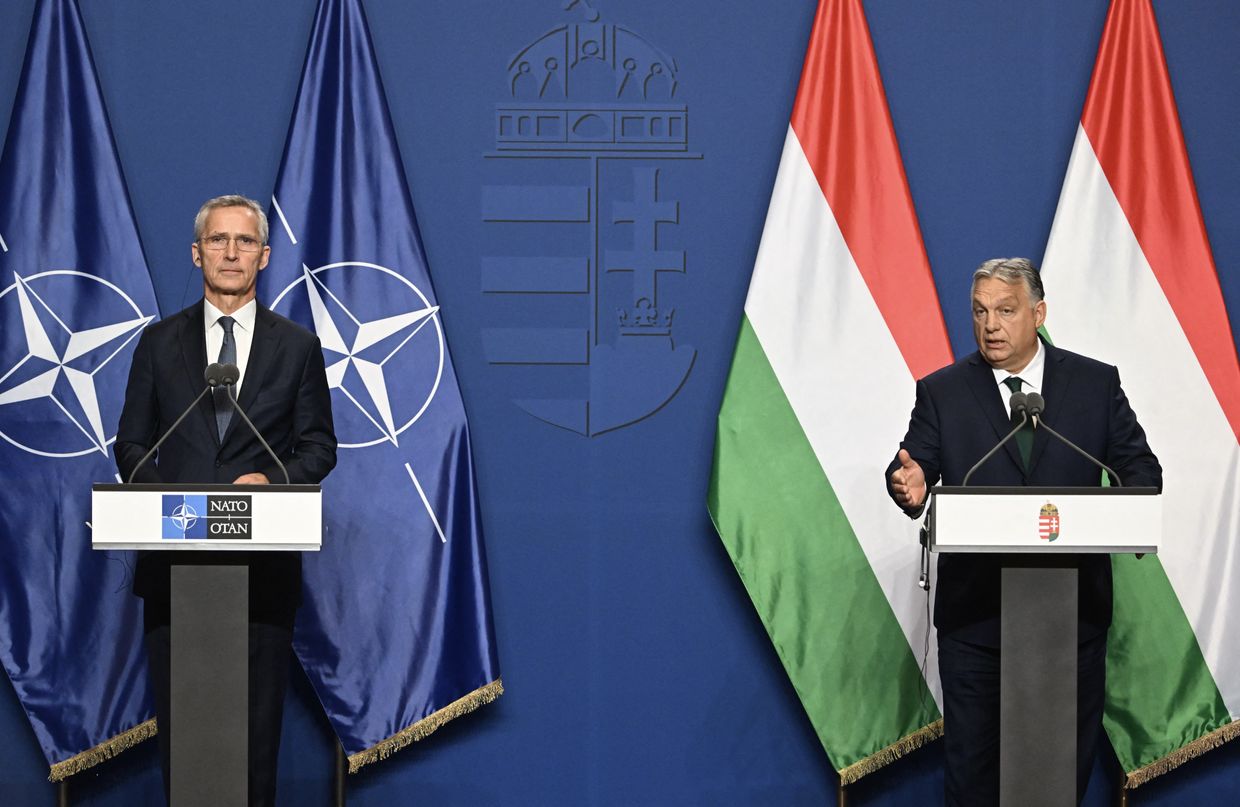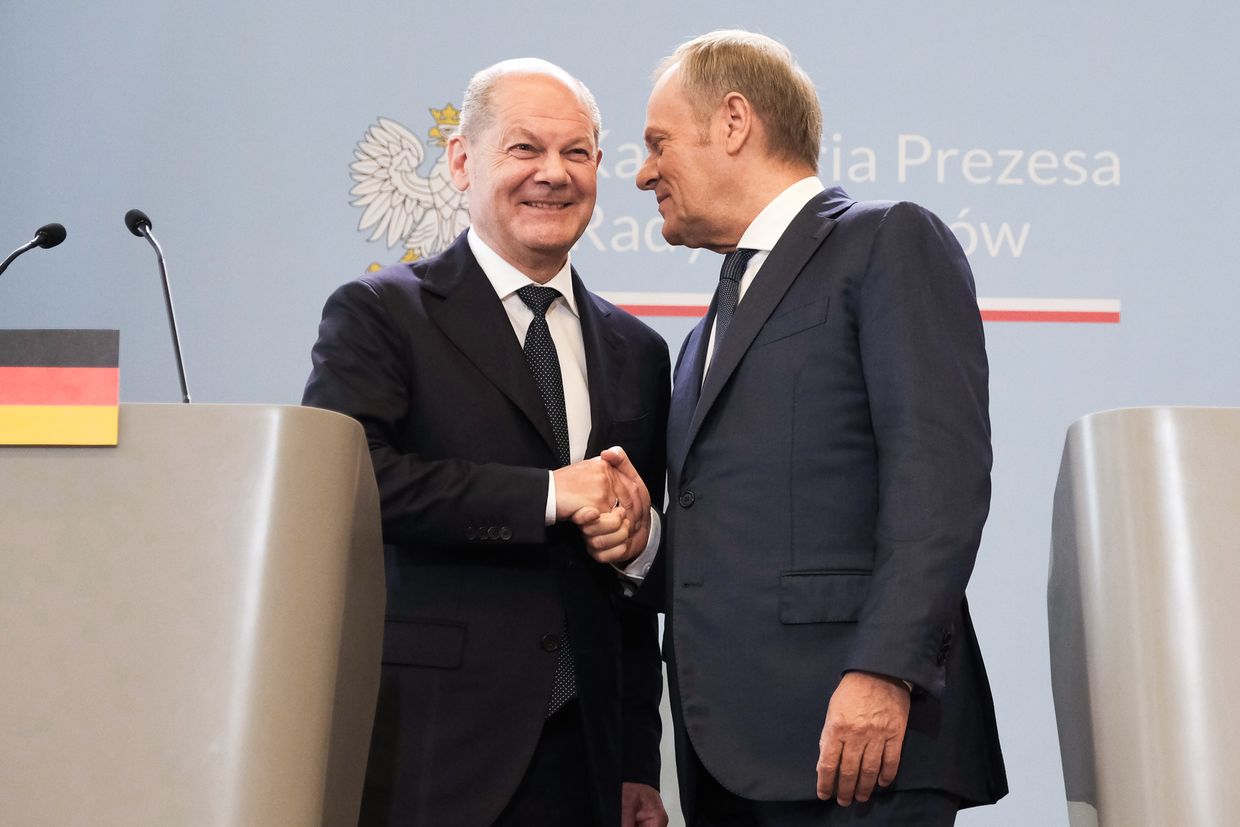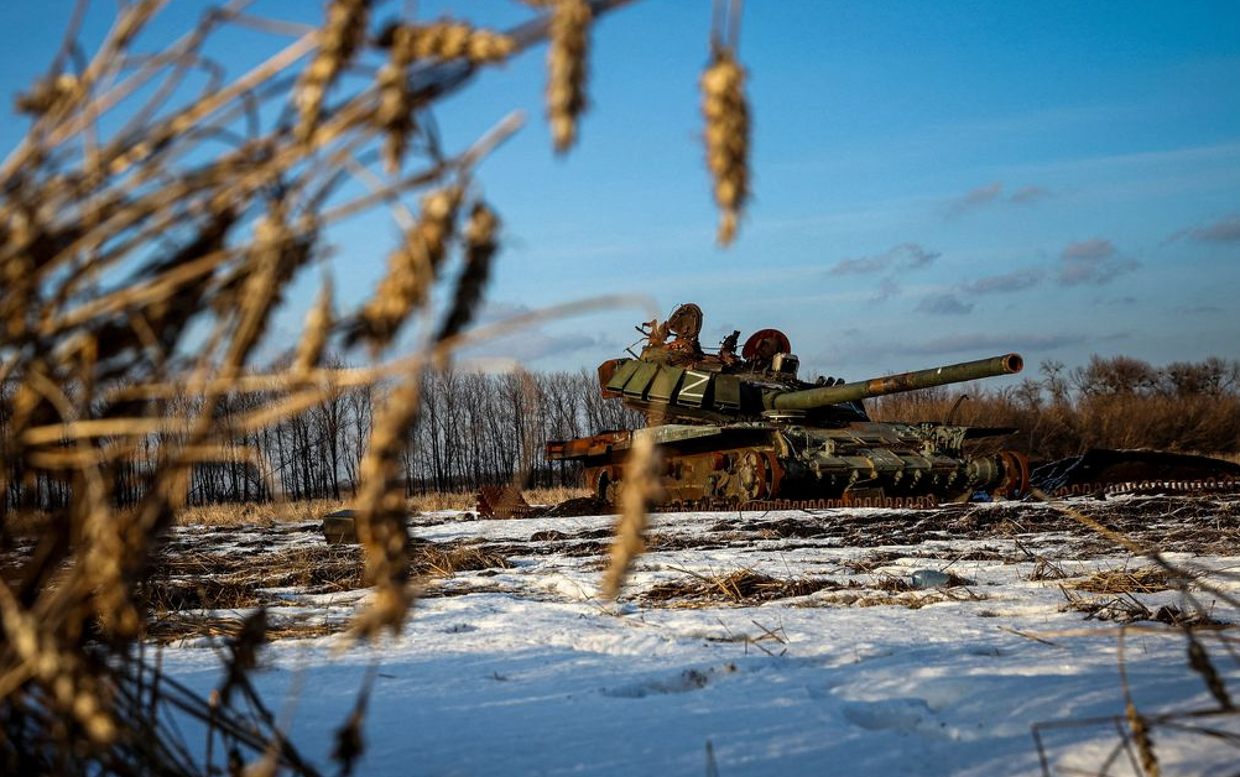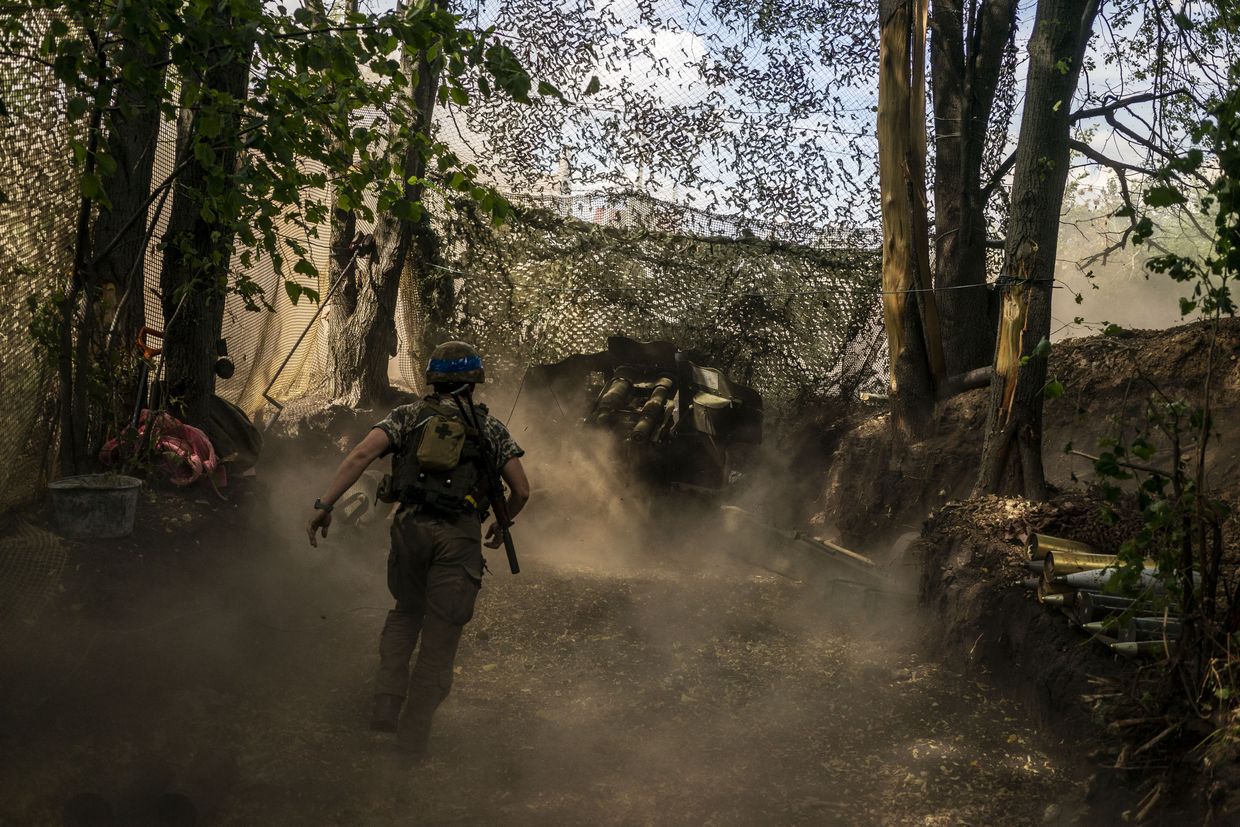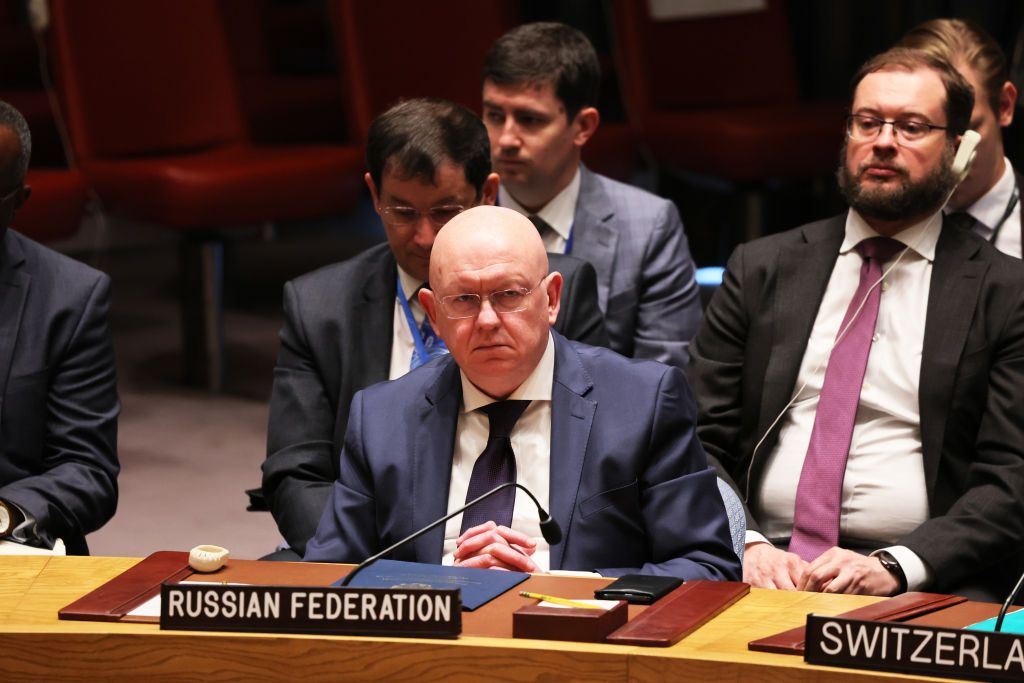Ukraine war latest: Zelensky dismissed Orban's ceasefire proposal during his visit to Kyiv, official says
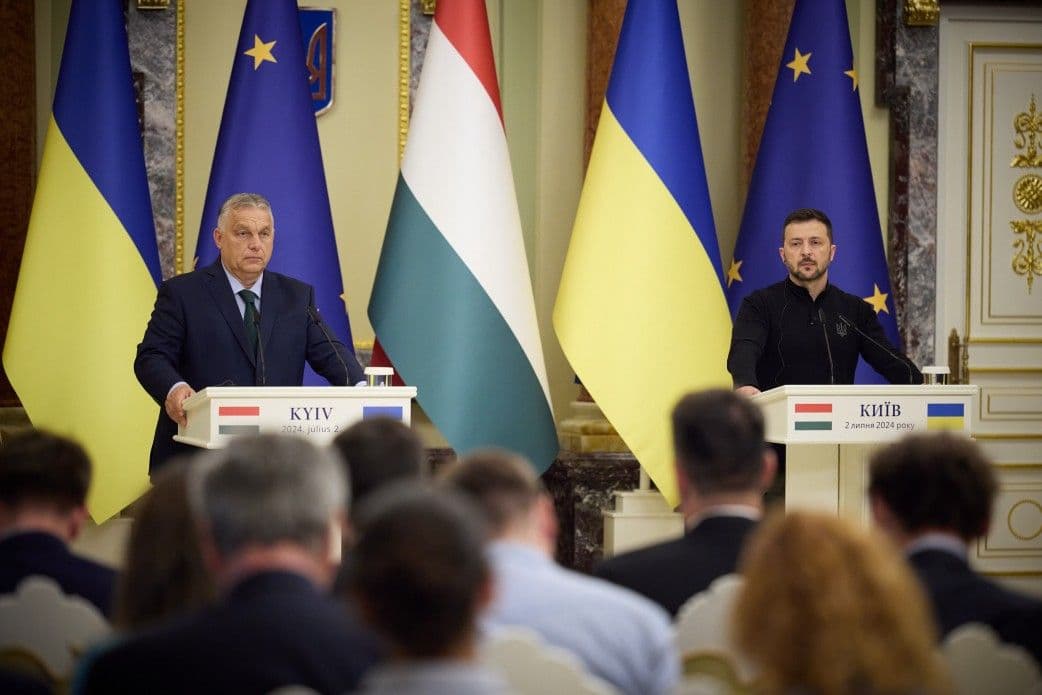
Key developments on July 2:
- Orban urges Zelensky to consider ceasefire during visit to Kyiv
- U.S. to announce $2.3 billion military aid package to Ukraine 'soon'
- Ukraine hit ammunition depot in Russian-occupied Crimea, Air Force confirms
- Active Russia-Ukraine front line has expanded, Syrskyi says
- NATO plans to establish new post in Kyiv, 'Trump-proof' Ukraine aid, WSJ reports
Hungarian Prime Minister Viktor Orban arrived in Kyiv on July 2 and urged President Volodymyr Zelensky to consider a ceasefire in order to "speed up peace talks."
"I asked the president to think about whether we could reverse the order, and speed up peace talks with making a ceasefire first," Orban said in a statement to reporters after the two leaders met.
"A ceasefire connected to a deadline would give a chance to speed up peace talks. I explored this possibility with the president and I am grateful for his honest answers and negotiations."
While praising Ukraine's peace initiatives, Orban said that they take "too long."
Zelensky dismissed Orban's proposal, Deputy Head of the Presidential Office Ihor Zhovkva said.
"The President of Ukraine listened to him, but in response, he stated Ukraine's position – clear, understandable, and well-known," Zhovkva added.
Kyiv previously rejected a temporary break to hostilities, saying it would only provide a window of opportunity for Russia to regroup its forces.
Instead, Ukraine organized a global peace summit in Switzerland in June without Russia's participation to consider possible steps toward peace.
Orban and Zelensky also addressed long-standing issues between the two countries and steps toward improving relations.
Orban's first visit to Ukraine since the start of the full-scale invasion comes as Hungary takes over the European Union's rotating presidency of the Council of the European Union.
This has sparked controversy, with some European officials calling on European Council President Charles Michel to suspend Hungary's presidency.

Budapest has repeatedly opposed Ukraine's accession to NATO and the EU, sanctions on Russia, undermined Western aid efforts for Ukraine, and maintained close relations with Moscow throughout the full-scale war.
This has led to deteriorating relations between Ukraine and Hungary, which had already been strained before 2022.
Following their bilateral talks, Zelensky and Orban told journalists that their meeting was an important step toward solving long-standing problems between the two countries.
"The content of our talks today can become the basis for a future bilateral agreement between our states, which will regulate our relations," Zelensky said, as reported by European Pravda.
"We want to establish relations between our countries and to sign a cooperation agreement with Ukraine similar to those Hungary has already signed with other neighbors," Orban noted.
The Hungarian prime minister also offered support for modernizing Ukraine and praised progress in resolving the issues of the Hungarian minority in the country
Orban and Zelensky also agreed to open the first school for Ukrainian-speaking children in Hungary.
The previous day, unnamed sources in Budapest told the Guardian that the visit was confirmed after negotiations on the rights of the ethnic Hungarian minority living in Ukraine.
US to announce $2.3 billion military aid package to Ukraine 'soon'
Washington is preparing to announce "soon" a military aid package for Ukraine worth more than $2.3 billion, U.S. Defense Secretary Lloyd Austin said on July 2, Voice of America (VOA) reported.
Austin made the announcement during a meeting with Ukraine's Defense Minister Rustem Umerov in Washington.
The Pentagon chief said that the package will include air defense missiles, anti-tank weapons "and other critical munitions from U.S. stockpiles," VOA reported.
According to late June reports, the U.S. was preparing to announce new assistance for Kyiv worth about $150 million. The new package could include HIMARS (High Mobility Artillery Rocket System) rockets, anti-armor weaponry, small arms and grenades, as well as 155 mm and 105 mm artillery shells, as well as HAWK air defense interceptors, several media outlets reported, citing their unnamed sources.
President Volodymyr Zelensky tasked Umerov to "receive specific dates for the delivery of additional Patriot systems" that Ukraine has agreed on with its partners, he said in his evening address on July 2.
Washington announced in June it had deprioritized the near-term planned deliveries of foreign military sales to other countries, particularly Patriot and NASAMS missiles, to supply them to Ukraine first.
In April, the U.S. Senate passed a long-awaited aid package, which included $61 billion in military aid to Ukraine.
The Pentagon announced on April 26 that it was ready to move forward with sending $1 billion worth of weapons to Kyiv from U.S. stockpiles. The U.S. subsequently sent three other aid packages in the following months, authorizing a $400 million defense aid package, followed by $275 million and $225 million aid packages.
Over the winter months, Ukraine suffered a critical shortage of artillery shells, in large part due to delays in U.S. military aid. Russia has taken advantage of this, taking the city of Avdiivka in February.
Ukraine hit ammunition depot in Russian-occupied Crimea, Air Force confirms
The Ukrainian Air Force struck an ammunition depot in Russian-occupied Crimea on July 1, Air Force Commander Mykola Oleshchuk reported on July 2.
"Once again, Ukrainian aircraft 'destroyed' by enemy propaganda continue to successfully perform combat missions, launch missile and bomb attacks on occupied positions, and eliminate important military facilities in the enemy's deep rear," Oleshchuk wrote on Telegram.
Oleshchuk's statement comes after news about explosions on July 1 in Balaklava, a municipal district of the city of Sevastopol.
Mikhail Razvozhayev, the Russian proxy leader in Sevastopol, claimed that air defenses were operating in the city.
Razvozhayev claimed that according to the preliminary data, five air targets were destroyed near Balaklava, "but the wreckage fell in the coastal zone." No casualties were reported.
Telegram channel Crimean Wind shared a photo reportedly taken by locals showing a tall column of smoke rising above Balaklava, presumably near a local thermal power plant.
Explosions were also reported in the area of Cape Fiolent, Radio Free Europe/Radio Liberty's Krym Realii project reported.
Oleshchuk did not specify which settlement the ammunition depot was hit in.
Ukraine has carried out multiple successful attacks against Russian targets in occupied Crimea and its vicinity, heavily degrading the Russian Black Sea Fleet.
Ukrainian forces struck around 15 air defense systems in Russian-occupied Crimea over the past two months, Ukraine's Center for Strategic Communications (Stratcom) reported on June 17.
Active Russia-Ukraine front line has expanded, Syrskyi says
The active Russia-Ukraine front line has recently expanded as intense fighting continues in the areas of Pokrovsk and Toretsk, Ukraine's Chief Commander Oleksandr Syrskyi said on July 2.
He added that the intensity of fighting in other segments of the front line has recently decreased.
The Toretsk sector in Donetsk Oblast has become another hotspot in recent weeks, the general said. Fierce fighting of different intensity is also ongoing in the Kurakhove, Vremivka, Kramatorsk and Kharkiv sectors, according to Syrskyi.
Moscow's troops have increased their attacks near the town of Toretsk in June after a "long lull" in fighting in the area. Russia carried out 17 attacks in this direction, Ukraine's General staff said in its latest update on July 2.
The situation in the Pokrovsk sector is difficult, according to Syrskyi. Russia wants to break through Ukraine's defenses and has rotated strike units, removing the units "whose assault forces have completely lost their combat capability," Syrskyi said.
"Despite the reinforcement of our units with reserves, this area requires constant attention and additional ammunition and firepower," he added.
The key problem for Ukrainian commanders are "manning units with motivated, well-trained military," Syrskyi said, as well as providing soldiers with modern electronic warfare and air defense equipment capable of effectively countering Russian drones.
"We have an advantage in the number and quality of combat copters, primarily bombers and FPV drones, and the skill of the operators who use them. This is the key to our success and the safety of our soldiers," Syrskyi said.
NATO plans to establish new post in Kyiv, 'Trump-proof' Ukraine aid, WSJ reports
NATO plans to establish a senior representative post in Kyiv, as well as a new command in Germany to coordinate assistance for Ukraine, the Wall Street Journal (WSJ) reported on July 1, citing U.S. and allied officials.
This is part of the alliance's effort to safeguard long-term aid for Ukraine should Donald Trump return to the White House after the U.S. presidential election later this year, the outlet wrote.
Ex-President Trump, the Republican Party's presumptive nominee, has repeatedly criticized NATO and assistance for Kyiv.
The new measures, which are expected to be announced at the upcoming NATO summit in Washington, will involve the new command center in Germany's Wiesbaden coordinating the flow of military equipment and the training of Ukrainian soldiers, the WSJ wrote.
The steps should help better coordinate the assistance and bring the Ukrainian military closer to NATO standards.
Allied leaders previously said that the July 9-11 Washington summit would contain "new language" on Ukraine's NATO prospects and focus on a roadmap toward its eventual membership.
Ukraine also hopes to secure "guaranteed" military funding commitment from NATO allies. While no decision has been reached so far, outgoing NATO Secretary General Jens Stoltenberg proposed to provide Ukraine with at least 40 billion euros ($43 billion) in military support each year "for as long as necessary."



